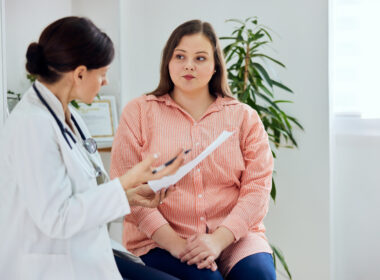Vitamin C–best known as the supplement taken at the first sign of a cold–may actually improve fertility for both women and men. If you’re part of the 10-15% of couples worldwide struggling to get pregnant, could this humble vitamin help increase chances of conception [1]?
What is vitamin C?
Also known as ascorbic acid, vitamin C is a nutrient used by your body to form blood vessels, cartilage, muscle, collagen, and bones. Vitamin C is also a major nutrient used in the body’s healing process, playing a role in everything from the healing of cuts and tissue damage, to absorbing iron, to making collagen.
Vitamin C is also highly abundant, and is found in many common foods like citrus fruits, strawberries, and broccoli. Most people who eat a healthy diet are able to get the recommended daily amount of vitamin C (90mg per day for men and 75mg for women) through food alone [2]. However, your body cannot store vitamin C for very long, so getting enough every day is critical for maintaining adequate levels.
Vitamin C is also a common antioxidant–a compound that helps protect the body’s cells from the damaging effects of free radicals, the harmful molecules that are made when your body is exposed to cigarette smoke, UV radiation from the sun, pollution, breaking down processed foods, and even just the natural effect of cells using oxygen to survive [1, 2]. An excess of free radicals accumulated in the body plus a lack of antioxidants like vitamin C can lead to oxidative stress, which can present itself as cancer or heart disease by damaging DNA in the body’s cells [3].
Vitamin C is also a common antioxidant–a compound that helps protect the body’s cells from the damaging effects of free radicals, the harmful molecules that are made when your body is exposed to cigarette smoke, UV radiation from the sun, pollution, breaking down processed foods, and even just the natural effect of cells using oxygen to survive.
Can free radicals affect fertility?
In both women and men, oxidative stress [OS] from an accumulation of free radicals also plays a role in decreased fertility. In men, this is seen in decreased sperm mobility, sperm count, and the ability for the sperm and egg to fuse together [4].
For women, the effects of OS can be seen at the very beginning stages of the fertility cycle. Before eggs are mature enough to be released from the ovaries they are called oocytes. DNA damage to the oocytes from OS can lead to lipid peroxidation (think of the fat in your cells getting “rusty”), cell walls breaking down, and loss of cellular energy (“mitochondria is the powerhouse of the cell!”). A “rusty” oocyte isn’t likely to mature into a healthy egg, and therefore it also has less of a chance of becoming fertilized and developing successfully as an embryo.
DNA damage to the oocytes from OS can lead to lipid peroxidation, cell walls breaking down, and loss of cellular energy.
The endometrium is also highly sensitive to oxidative damage since the cells of the uterine walls have to “remodel” to allow an embryo to implant. High levels of OS can affect the genes that tell the endometrial cells how to receive and accommodate an embryo trying to implant into the uterine lining, leading to an unfavorable environment for development [5].
The endometrium is also highly sensitive to oxidative damage since the cells of the uterine walls have to “remodel” to allow an embryo to implant.
Oxidative stress can also wreak havoc on granulosa cells–the cells found within the ovarian follicles that produce estrogen and support the developing oocyte. When these granulosa cells and oocytes are damaged by free radicals, the odds of developing polycystic ovary syndrome (PCOS), endometriosis, and infertility aumentar.
And the damage to reproductive health caused by OS isn’t contained to the pre-conception period. According to the Asociación Americana del Embarazo, “recurrent pregnancy loss, spontaneous abortion, preeclampsia (high blood pressure during pregnancy), and fetal death are all linked to oxidative stress. Intrauterine growth restriction (IUGR), a condition where the fetus is smaller than expected for the number of weeks of pregnancy, is also linked to too many [OS]. Oxidative stress can play a role in embryonic resorption, where the fetus is reabsorbed back into the body, leading to miscarriage.”
As disturbing as it is that something as seemingly minute as free radicals can lead to big problems with infertility or even miscarriage, the good news is that one possible solution could be just as powerful: vitamin C.
Antioxidants, like vitamin C, are critical for good fertility
Without getting too much into a high school chemistry lesson, free radicals are so destructive because they don’t have a complete set of valence electrons, and steal their missing electron from other molecules in the body. This thievery comes with a cost: it slowly destroys cells as the molecules that make them up are broken down. By contrast, antioxidants are “scavenger” compounds that find free radical compounds in the body, and stabilize them by donating an electron, effectively turning the free radicals’ destructive mode “off” [6]. Any compound that donates electrons to “turn off” free radicals are called antioxidants: vitamin C, vitamin E, and the minerals copper, zinc, and selenium are all antioxidant compounds [6].
With the threat of free radicals neutralized by antioxidants, oocytes can mature into healthy eggs, and granulosa cells can continue producing estrogen to maintain healthy cycles, possibly increasing a woman’s odds of achieving pregnancy. Not only that, but antioxidants like vitamin C have been proposed to improve blood flow in the endometrio, decrease levels of male hormones common in women with SOP, lower risk of diabetes, and improve fertile moco cervical [1].
Antioxidants like vitamin C have been proposed to improve blood flow in the endometrium, decrease levels of male hormones common in women with PCOS, lower risk of diabetes, and improve fertile cervical mucus.
A multivitamin a day keeps infertility away?
One fascinating study in the journal Scientific Reports looked at 2,162 women over the course of 5 years, measuring the relationship between the women’s composite dietary antioxidant index (CDAI)–the measure of antioxidant intake from food–and their rates of infertility. Researchers found that the women with higher levels of CDAI (with vitamin C being one of the examined antioxidants) had lower reported infertility. In fact, the highest-CDAI group had up to 60% lower odds of infertility compared to the group with the lowest CDAI! [5].
This makes it a good idea to start taking a multivitamin when trying to conceive. In fact, women trying to achieve pregnancy are often recommended by their doctor to start taking a prenatal multivitamin, especially to ensure that if conception does occur, the baby in-utero gets enough folate right from the start to prevent neural tube defects, heart defects, cleft palate, and cleft lip. Most multivitamins also have at least 100% of the US Health Recommended Daily Intake of antioxidant rich vitamins and minerals like vitamin C, which, as mentioned before, can protect egg quality by keeping free radicals from damaging the oocytes.
Most multivitamins also have at least 100% of the US Health Recommended Daily Intake of antioxidant rich vitamins and minerals like vitamin C, which, as mentioned before, can protect egg quality by keeping free radicals from damaging the oocytes.
Other fertility benefits of vitamin C
In the ovaries, vitamin C stimulates the production of fase lútea hormones, like progesterona, which are necessary for “remodeling” the uterine walls to allow for implantation of a blastocyst and the maintenance of a pregnancy [7]. Vitamin C also regulates collagen, which is necessary during the folicular phase for basic ovarian functions like follicle growth, forming the corpus luteum, and repairing the ruptured follicle after ovulation [7].
According to a study in the journal Nutrientes, “Historical studies on severe vitamin C deficiency have documented ‘loss of the [fertility cycle]’ in guinea pigs and [sangrado menstrual abundante] in women with scurvy, likely a combined effect of bleeding diathesis [impaired blood clotting] and hormonal changes such as lowered progesterone.” Furthermore, “inadequate vitamin C intake might disrupt the regulation of […] menstrual cycles, impair ovarian and uterine function, and negatively impact female fertility” [7].
The role of supplements in a healthy diet
However tempting it may be to supplement your way to perfect health without having to change up your diet, it’s a good idea to try to get enough important nutrients through the foods we eat. Vitamin C is found in many fruits and vegetables like citrus, berries, potatoes, tomatoes, peppers, cabbage, Brussels sprouts, broccoli and spinach. And while supplements can have their place, they should be exactly that: a suplemento to an already healthy, nourishing diet. And while vitamin C is safe in appropriate doses, there are side effects to overdoing it like nausea, heartburn, stomach cramps, headaches, and skin flushing. Long-term use of high doses (exceeding 2000mg per day) can also increase risk of kidney stones [2].
The bottom line on vitamin C and fertility
Vitamin C and other antioxidants clearly play an important role in menstrual cycle health, which is the foundation for good fertility and healthy pregnancies. Because vitamin C is abundant in many healthy foods, making an effort to get more vitamin C through the foods you consume could be the first step towards making healthy dietary changes. However, for those with nutritional deficiencies that diet alone can’t solve (such as those caused by hormonal birth control), supplementing can make good sense, too. As always, be sure to check with your doctor or other healthcare professional before starting a new supplement regimen.
Interested in other Natural Womanhood articles that talk about different nutrients that may improve fertility? Check these out!
- 4 suplementos para aumentar la fertilidad de forma natural cuando se intenta concebir
- Book Review: Real Food for Fertility
- Elogio del magnesio: Lo que este mineral esencial hace por el organismo
- Guía de oligoelementos para la salud antes, durante y después del embarazo
Referencias
- Smits, R. M., Mackenzie-Proctor, R., Fleischer, K., & Showell, M. G. (2018). Antioxidants in fertility: Impact on male and female reproductive outcomes. Fertilidad y esterilidad, 110(4), 578–580. https://doi.org/10.1016/j.fertnstert.2018.05.028
- Mayo Foundation for Medical Education and Research. (2023, August 10). Vitamin C. Mayo Clinic. https://www.mayoclinic.org/drugs-supplements-vitamin-c/art-20363932#:~:text=Vitamin%20C%20(ascorbic%20acid)%20is%20a%20nutrient,vessels%2C%20cartilage%2C%20muscle%20and%20collagen%20in%20bones.&text=Vitamin%20C%20is%20an%20antioxidant%20that%20helps,from%20the%20sun%2C%20X%2Drays%20or%20other%20sources.
- Pizzino, G., Irrera, N., Cucinotta, M., Pallio, G., Mannino, F., Arcoraci, V., Squadrito, F., Altavilla, D., & Bitto, A. (2017). Oxidative Stress: Harms and Benefits for Human Health. Oxidative medicine and cellular longevity, 2017, 8416763. https://doi.org/10.1155/2017/8416763
- Ruder, Elizabeth Ha; Hartman, Terryl Jb; Goldman, Marlene Bc. Impact of oxidative stress on female fertility. Current Opinion in Obstetrics and Gynecology 21(3):p 219-222, June 2009. | DOI: 10.1097/GCO.0b013e32832924ba
- Shao, Y., Ma, L., Zhou, J. et al. Impact of dietary antioxidants on female infertility risk: evidence from NHANES. Sci Rep 14, 22623 (2024). https://doi.org/10.1038/s41598-024-72434-8
- Understanding antioxidants. Harvard Health. (2019, January 10). https://www.health.harvard.edu/staying-healthy/understanding-antioxidants#:~:text=Antioxidants%20neutralize%20free%20radicals%20by,other%20cells%20in%20the%20body
- Coker, S. J., Dyson, R. M., Smith-Díaz, C. C., Vissers, M. C. M., & Berry, M. J. (2023). Effects of Low Vitamin C Intake on Fertility Parameters and Pregnancy Outcomes in Guinea Pigs. Nutrientes, 15(19), 4107. https://doi.org/10.3390/nu15194107






